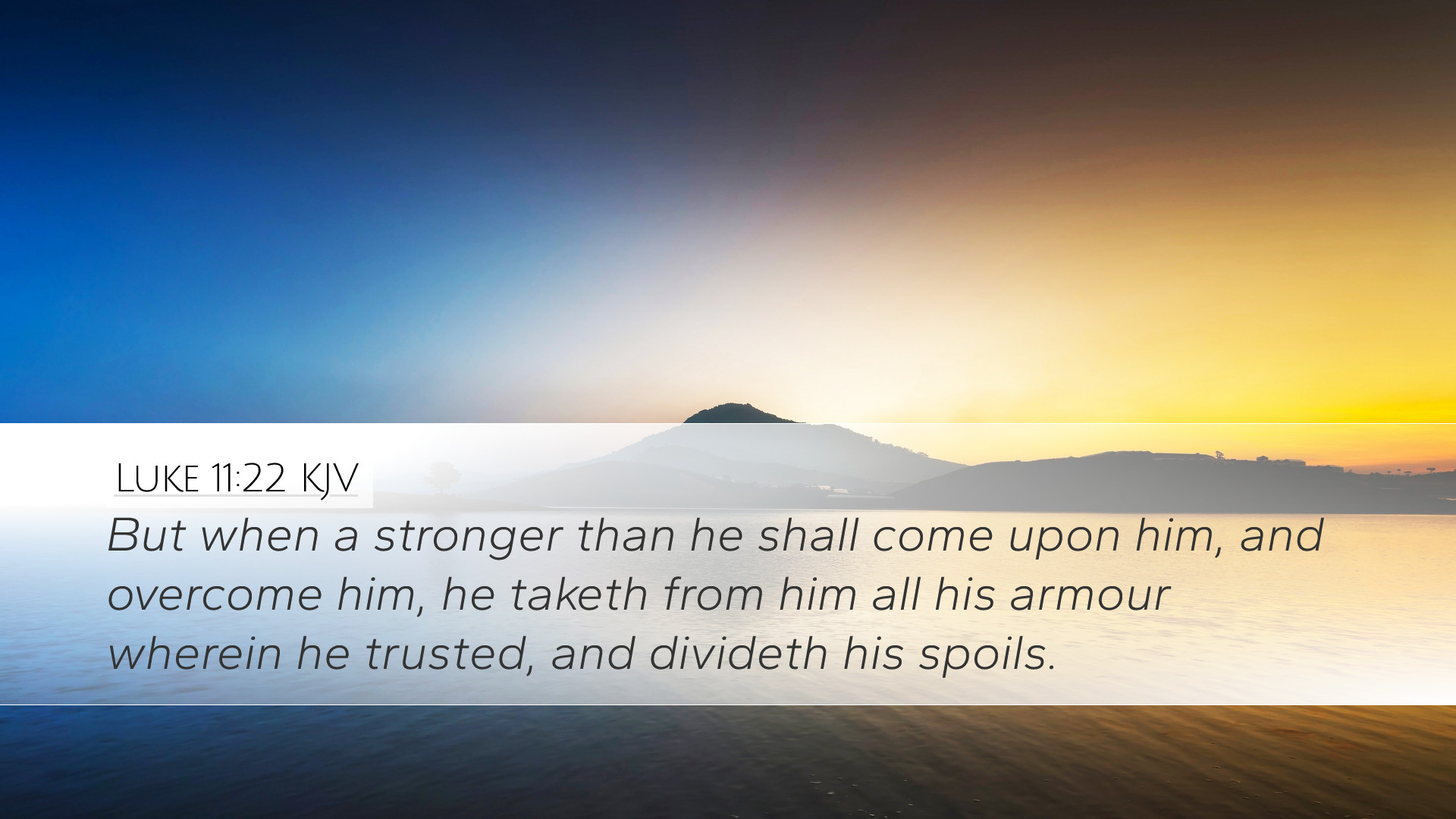Commentary on Luke 11:22
Luke 11:22 states: "But when someone stronger attacks and overpowers him, he takes away the armor in which the man trusted and divides up the spoils." This verse forms part of a deeper teaching by Jesus on spiritual warfare and the dynamics of the Kingdom of God. Through the insights of various public domain commentators, we explore the implications and meanings embedded in this verse.
Context and Overview
In this passage, Jesus is addressing the reality of spiritual conflict. He is explaining the authority and power of His ministry as the Messiah against the forces of evil. Understanding this verse requires recognition of the immediate context in which it is placed. It follows Jesus' exorcism of a mute spirit, illustrating His power over demonic forces.
Insights from Public Domain Commentaries
Matthew Henry's Commentary
Henry emphasizes the significance of strength in spiritual warfare. He notes that the “stronger” one represents Christ, who is far mightier than the power of Satan. The “strong man,” symbolizing evil, possesses armor—representing the fortifications he relies upon to maintain dominion. However, Christ, being the stronger, not only overcomes this adversary but also disarms him:
- Disarming the Enemy: Henry explains that the "armor" relates to the defenses that evil spirits use to exert control over individuals. When Christ overcomes, He strips away these defenses.
- Dividing the Spoils: The “spoils” refer to the blessings and victories won through Christ’s victory over evil. This includes both the liberation of afflicted persons and the establishment of God’s reign on earth.
Albert Barnes' Notes on the Bible
Barnes offers a rigorous theological exploration of the metaphors used in this verse. He points out:
- The Strong Man: The strong man embodies Satan, who is equipped with powerful tools and stratagems to deceive and bind individuals.
- Christ’s Authority: Barnes argues that Jesus' authority over evil forces is intrinsic to His identity as the Son of God. His ability to overpower the strong man is a testament to His divine nature and mission.
- Possession and Influence: In discussing the spoils, Barnes notes that this extends beyond personal liberation—it speaks of the broader impact on communities and nations as God's kingdom advances.
Adam Clarke's Commentary
Clarke delves into the practical implications of the verse, linking it to the daily experiences of believers:
- Spiritual Conflict: Clarke highlights that believers are often engaged in spiritual battles. The strong man may refer to the strongholds within one's own life that resist the power of the Gospel.
- Strength Through Christ: Clarke emphasizes that believers are empowered through Christ. The victory over these strongholds is possible because of Christ’s strength that works within them.
Theological Implications
This verse conveys profound theological implications relevant for pastors and theologians. It illustrates:
- The Reality of Spiritual Warfare: The acknowledgment of the existence of a powerful adversary is essential for a proper understanding of the Christian faith.
- The Nature of Christ's Victory: Understanding Christ's victory over evil reassures believers of ultimate triumph in their spiritual battles.
- Empowerment of the Believer: Recognizing one’s position in Christ enhances faith and resilience against the challenges of spiritual opposition.
Practical Applications
Reflecting on Luke 11:22 offers various practical applications for believers:
- Awareness of the Enemy: Believers should cultivate a keen awareness of spiritual deception and resistance as they pursue their faith.
- Dependence on Christ: Christians are encouraged to rely on the strength of Christ in their personal struggles, acknowledging that victory comes from His power.
- Mission of the Church: The church is called to engage in spiritual warfare, helping to liberate others and proclaim the Good News that offers freedom from bondage.
Conclusion
Luke 11:22 invites us to consider the dynamics of spiritual authority and the continual battle between good and evil. The insights drawn from commentators such as Matthew Henry, Albert Barnes, and Adam Clarke deepen our understanding of its implications for both individual believers and the church as a whole. In the strength of Christ, we recognize that while we face a powerful adversary, we serve a surpassingly greater Christ who secures our victory and transformation.


